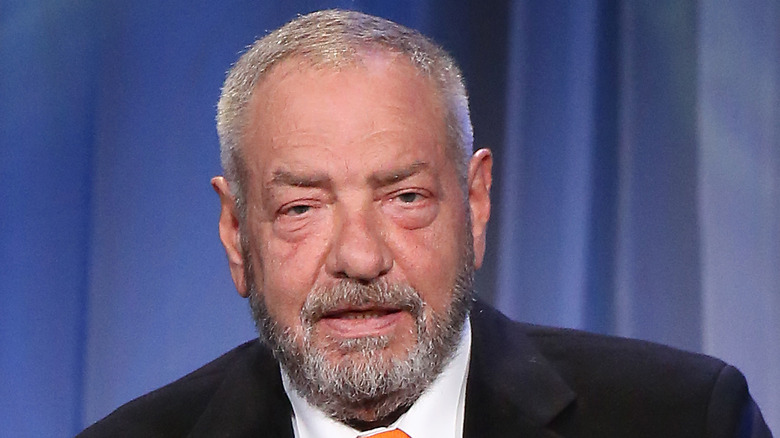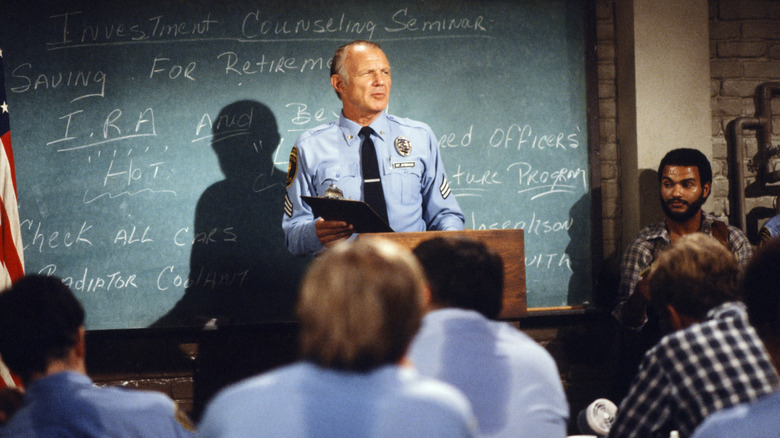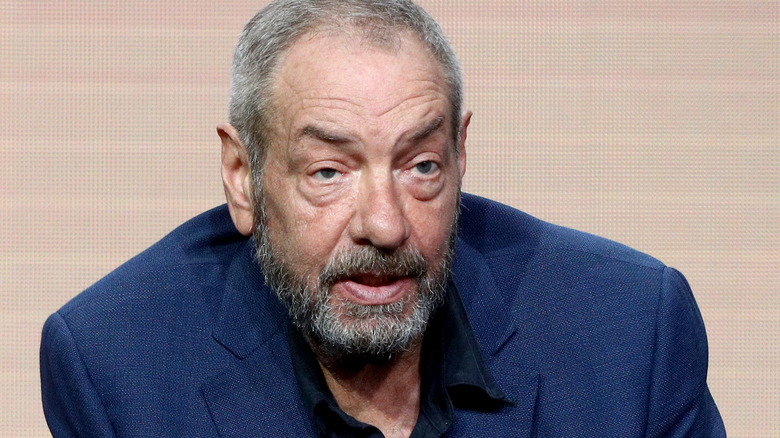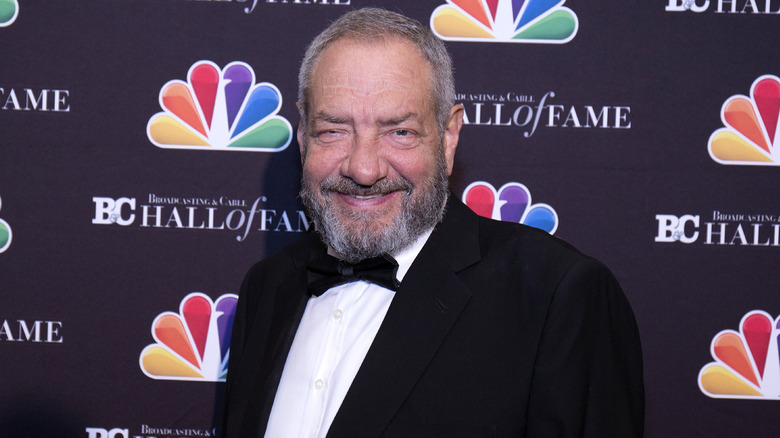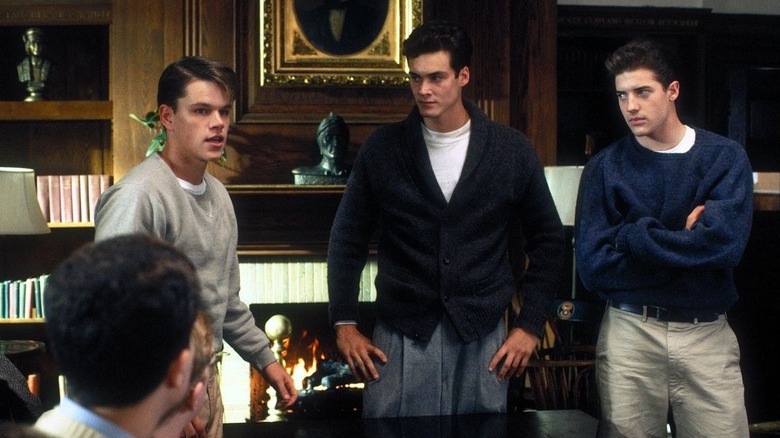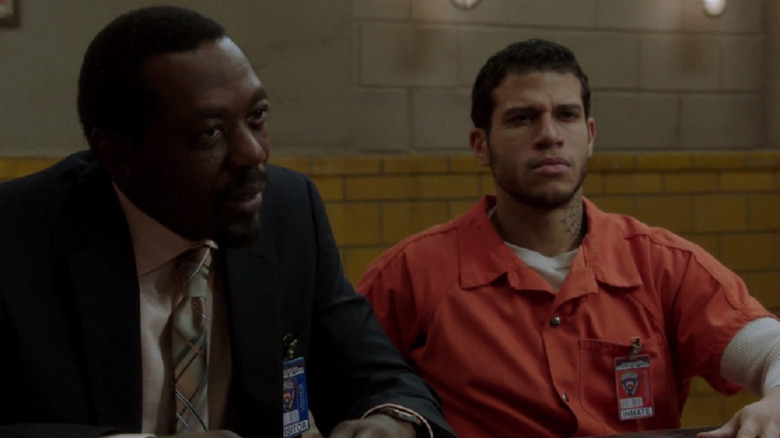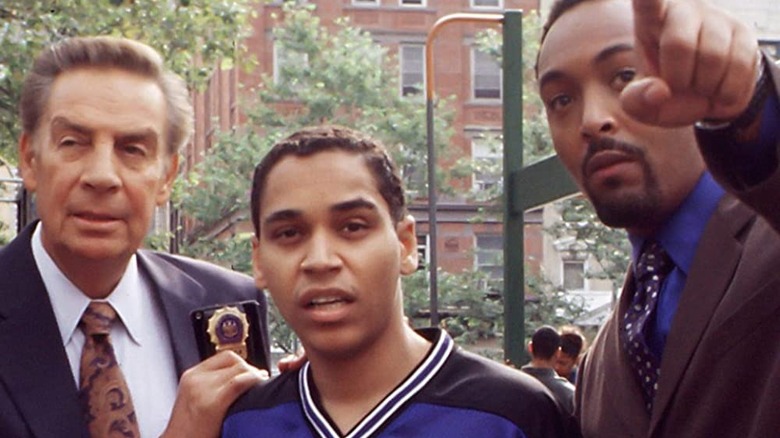The Untold Truth Of Dick Wolf
There are a lot of TV writers. Few make it to become showrunners, writing and producing their own series. Even fewer end up with multiple successful shows under their helm. It's rarer still for those writers to become legendary producers who remake the television landscape. Dick Wolf is near the top of that very short, very vaunted list. Wolf had his first feature script produced in 1978 and first started writing for TV in 1985, but he's best known for changing the world of network police dramas with his brainchild "Law & Order" in 1990. Since then, the series has had spinoff after spinoff, and Wolf's other procedurals have further built his genre-defining reputation.
Wolf is still producing more and more series, and still has a "Law & Order" spinoff on the air, the record-setting "Law & Order: Special Victims Unit." He's achieved levels of financial success reached by few creatives, influenced plenty of big names, traveled the world both with his series and on his own, and created his own trademark television sensibilities. Somehow, he's found time to produce documentaries, write novels, and nurture a few careers. Here's a closer look at the man, the myth, the legend: Dick Wolf.
Wolf was an ad exec
Of course Dick Wolf is a masterful brand builder; after all, his first career was as an ad man. After graduating from the University of Pennsylvania, Dick Wolf followed in his ad exec father's footsteps, beginning his professional life as a copywriter for the ad firm Benton & Bowles. Apparently, he came up with the slogan "You can't beat Crest for fighting cavities" for Crest's TV ads. Wolf then left the ad world at 30 to become an entertainment writer because, as Wolf once put it, he "didn't want to sell toothpaste anymore."
Yet in some ways, Wolf never left advertising. When "Law & Order" took off, Wolf activated a master plan for building his own entertainment brand. That not only includes "Law & Order," but also his other series, like "FBI" (and its spinoffs) and the "Chicago" franchise. All three are still thriving. Plus, there is a feel to every project Wolf touches that makes it indelibly his. In some ways, Dick Wolf has become his own brand, with plenty of sub-brands. Once an ad man, always an ad man.
His first TV gig was on the Hill Street Blues staff
Dick Wolf began his career as a screenwriter. His first produced screenplay was for a 1978 movie called "Skateboard" about a Hollywood agent who makes a skateboard team win a contest to pay off a bookie. Sure, it stars Leif Garrett, but considering that it made an anemic $1.3M at the box office, it wasn't exactly the beginning of a big career. He got another screenplay produced in 1981 ("Gas," a Howie Mandel-starring comedy), but then didn't have a single subsequent produced credit until 1985, when he joined "Hill Street Blues." He was reluctant to get into the small screen—ironic, given that's the format he's best known for these days.
"My agent called and said, 'Do you want to do TV?'" he explains in an interview with The Hollywood Reporter. "I said, 'Absolutely not.' I was a screenwriter! She said it was 'Hill Street,' my favorite show, so I said, 'Oh, that's different.'" So he joined "Hill Street." A year later, he joined the writing team at "Miami Vice" and subsequently got two more features produced. Then, in 1990, he created several shows that went to series, including a little courtroom police drama called "Law & Order."
Wolf has broken records
Dick Wolf obviously took the crime drama to unseen heights when he created "Law & Order." Yet "Law & Order" did more than just redefine a genre for modern television. By running from 1990-2010, "Law & Order" tied "Gunsmoke" for the longest-running primetime series in television history.
Some argue that "Law & Order" surpasses "Gunsmoke," as spinoffs continue to this day, and the original "Law & Order" is coming back for Season 21. In 2019, "Law & Order: Special Victims Unit" was also renewed for its 21st season. This is some GOAT stuff right here: tying a record, only to then break it with another series. These two series alone would make for a legendary career. Yet in many ways, they're just the tip of the iceberg for Wolf.
Wolf won an Oscar
Procedurals don't get as much attention and prestige during awards season as other shows, like those found on premium cable and, more recently, streaming services. Yet Dick Wolf, king of the crime procedural, has won one of the most vaunted entertainment awards out there: an Academy Award. Kind of.
Dick Wolf lived in New York while working in advertising. In fact, according to a Deadline article, he was in New York in preproduction on a miniseries about terrorism, called "Terror," when the Twin Towers fell. Of course, as the article explains, this project was scrapped after the attack. His company, Wolf Productions, was also producing a reality TV pilot about an NYPD squad. This evolved into a short documentary called "Twin Towers," which ended up winning the Oscar for Best Documentary (Short Subject).
Of course, Wolf's attention to the stories of first responders forms the basis of his "Chicago" franchise, so it isn't surprising that his company did such a fine job of telling the story of the terror attack that rocked America. Still, the win shows that Wolf refuses to be pigeon-holed.
He's written three novels
Dick Wolf's writing career segued from film to TV. Yet that still left the world of books to explore, which Wolf entered with 2012's "The Intercept." That novel, the first in Wolf's Jeremy Fisk series, is described by NPR as "'Law & Order' meets Tom Clancy." The plot centers around terrorism in New York City. According to the NPR interview, the book picked up from "Terror," Wolf's aforementioned canceled miniseries.
There are also two other novels in the Jeremy Fisk series: 2014's "The Execution" and 2015's "The Ultimatum." Naturally, all three are thrillers, and Fisk is an NYPD Special Agent, so it's obviously set in a world Wolf knows very well. Still, novel writing was a departure for Wolf. As he told NPR, "I'd say the biggest difference is that you don't have 140 other people to depend on."
Wolf is an Honorary Consul of Monaco
Oh Monaco, the .8-square-mile nation that lives large in the global imagination. The country's ties with American entertainment are famously exemplified by Grace Kelly's marriage to its prince. This small, yet glamorous Mediterranean city-state is also known as the "Billionaires' Playground," according to Business Insider, complete with legendary casinos and its own Grand Prix.
Monaco also has a very successful Honorary Consul in Dick Wolf. In November 1998, Monaco established consuls in 8 major U.S. cities, including Los Angeles. So Dick Wolf, one of the most successful TV producers of all time, is Monaco's representative in America's glitziest city. Who could have expected a humble Crest toothpaste marketer and producer of blue-collar cop shows would wind up an international dignitary?
Wolf has had big series set in NYC, DC, Los Angeles, Chicago, and the UK
Since it's shot on location in New York, the setting plays a huge role in "Law & Order." New York defines much of what happens in the series, so most of the spinoffs take place there, focusing on subcategories of crime.
Eventually, though, Wolf realized a simple way to make a spinoff was simply to set a show in a new place. Maybe he was inspired by his writing gig at "Miami Vice," but place also became the basis for several of his other series, like 1994's "New York Undercover" and 2000's "D.C."
This model was key to spinoffs of another successful network procedural franchise, "CSI," which launched "CSI: Miami" in 2002. Although not as successful as "Special Victims" or "Criminal Intent," "Law & Order: LA" and "Law & Order: UK" also exist. Then there's Wolf's other big franchise: the "Chicago" series ("Chicago Fire," "Chicago Med," and "Chicago P.D.") are still on the air and don't seem to be slowing any time soon.
Plus, Wolf's turning his eyes to Vegas.
Wolf gets $200K/episode
While television is a lucrative business, few have ever attained the financial success enjoyed by Dick Wolf. According to a 2020 Forbes article, Wolf gets as much as $200,000 per episode. A Hollywood attorney quoted in the article calls this a "Spielberg deal." Forbes estimates in the article that he's worth $830 million, and deals just keep coming.
The sky-high compensation makes sense. The Forbes article shows how advertisers in 2019 spent $600 million on ad buys for the top crime shows, with three Wolf Entertainment series in the top 10 (and two in the top five). The article even goes so far as to call Wolf the undisputed king of the police procedural. Leaving behind movies to embrace TV was a good career move. Apparently, this Wolf can hunt.
Wolf didn't stop screenwriting
Wolf's big break was writing for "Hill Street Blues" in 1985, but that doesn't mean he stopped writing features. In fact, after transitioning to TV, what features Wolf did write ended up with stellar casts and garnered more attention.
His 1987 film "No Man's Land" starred Charlie Sheen and Randy Quaid, then both near the top of their careers. Then 1988's "Masquerade", starring Rob Lowe, Meg Tilly, and Kim Cattrall, made $15 million at the box office, actually turning a profit.
Arguably, Wolf's most successful screenplay was for 1992's "School Ties." The drama about anti-Semitism within a Christian boarding school has an amazing cast: pre-"Good Will Hunting" Matt Damon and Ben Affleck, as well as a young Chris O'Donnell and lead Brendan Fraser in his breakout role. (Though some say dopey comedy "Encino Man" was really his big Hollywood debut).
Wolf fired a writer
Given the current outcry over police brutality, wrongful incarceration, and problems with the American prison system, TV shows told from the point of view of police officers and prosecutors have begun drawing fire from activists. The Black Lives Matter movement has questioned whether such shows should even have a place on TV in their current format.
Dick Wolf has long argued that his shows aren't political. He's otherwise largely avoided directly responding to these new criticisms of his police procedurals. After George Floyd's death and the ensuing unrest in Los Angeles, one of Wolf's writers posted to Facebook a picture of himself holding a gun, claiming he will "light mother******s up who are trying to **** with my property I worked all my life for." Wolf fired the writer, then tweeted, "I will not tolerate this conduct, especially during our hour of national grief."
Ice-T sees him as a mentor
In 1992, musician Ice-T wrote a song called "Cop Killer." It's ironic, then, that for over 400 episodes, T has played police sergeant Fin Tutuola. In a March 2021 interview, Ice-T said Fin was only supposed to have a 4-episode arc. The erstwhile rapper had worked with Wolf before on "New York Undercover" and the "Law & Order" TV movie, and claimed Wolf became his "mentor" of sorts. Ice-T also said he spent so long on "SVU" because "everyone on the show is very cool, no one has harsh words[,] and Dick Wolf's checks clear, so it's nice work."
As a Hollywood Reporter article points out, Wolf has dealt with a lot of cast turnover. That's to be expected, given how many cast members he's employed over hundreds of episodes and over a dozen shows. Yet there are several, like Ice-T, who have become fixtures. One of those is Mariska Hargitay, the longtime, much-beloved star of "SVU." In a USA Today article, she said, "[Wolf's] vision is so awe-inspiring, it's hard to download how one person could not think of one show, but all these shows. And then after 20 years end, he's like 'Don't worry about it, I'll do it again.'"
Wolf has had 1 episode pulled
Only one episode of "Law & Order" has ever been pulled. "Sunday in the Park with Jorge" is based on an incident that actually happened during a New York Puerto Rican Day Parade, the Puerto Rican Coalition and others found the show's depiction of the Latinx community offensive. Wolf claimed it was a case of NBC caving to a special interest group, but it doesn't look like the network's stance will be reversed.
It should be noted that Dick Wolf has made strides for inclusivity in his series. Of Hargitay, Wolf said, "She is an enduring champion of the movement to end sexual violence, and dozens of episodes have dealt with the very same issues that have shifted into the spotlight in this country in the past two years." Wolf also told Forbes that he has 18 writers of color across his series and is trying to hire more. His 1994 series "New York Undercover" won several NAACP Image Awards. This show centers on "Black actor Malik Yoba as Detective J. C. Williams, and Michael DeLorenzo as his Puerto Rican partner," as the article puts it.
It's remarkable that, after thousands and thousands of episodes that hit on some pretty tense issues about gender and race, only one episode has been pulled down for good (though it's not the only one to spark public outcry). Is that because Wolf treats these topics with the respect they deserve? Or because of a broader, systemic failure to recognize the show's problematic, oversimplified lionization of police? The question is far from settled, but either way, "Law & Order" is here to stay.
